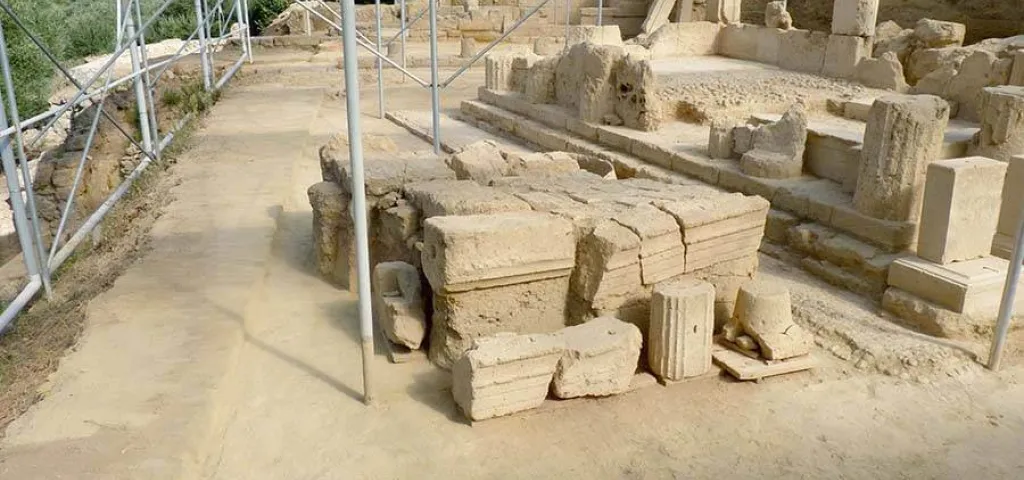
History - Location of the department
It was founded by the Presidential Decree (118/24th of April 2003) and began operating in 2003-2004. Together with the Department of Philology (fi rst academic operation year 2005-2006), it is a part of the School of Humanities and Cultural Studies at the University of the Peloponnese (Presidential Decree 118/24th of April 2003). The Department is housed in the buildings of the former 9th Infantry Regiment at the Kalamata Old Camp, which were granted to the School of Humanities and Cultural Studies by the Municipality of Kalamata. They are two listed buildings dating back to the 20th century, which were converted into modern teaching and administration spaces, and equipped with the necessary technical and logistical infrastructure for their adequate and safe operation: the former “command post” of the Military Camp, a neoclassical building of special aesthetic value hosts the Administration of the School, and the former military unit buildings host the lecture halls and the Library.
The historical city of Kalamata, an ideal city for the location of the DHACRM, constitutes – together with the wider area of Messinia – a signifi cant cultural space spanning from prehistoric times up to this day. The city’s historic centre includes the places where Classic, Byzantine, Frankish and Ottoman settlements were developed, as well as recent sites that developed during the city’s economic blossoming at the end of the 19th century. At the Archaeological Museum of Messinia (Agion Apostolon Square), the visitor gets to know the most important archaeological sites of the area from the Neolithic until the Post-Byzantine Era. Situated in a “pristine Mediterranean environment” near Kalamata, the archaeological site of Ancient Messene is one of the most signifi cant ancient cities, as far as the size and the preservation are concerned.
Undergraduate and Postgraduate studies
The undergraduate studies of the Department have two specialisations:
▶ Specialisation of History and Cultural Resources Management
▶ Specialisation of Archaeology and Cultural Resources Management
During the 4th semester, students choose one out of the two Specialisations of the Department.
The DHACRM curriculum includes three-hour core courses (1st, 2nd, 3rd, 4th semester), specialisation and elective courses (5th, 6th, 7th, 8th semester). The Internship is also part of the curriculum. The off ered courses are simultaneously reinforced by practical application in the excellently equipped Laboratories of “Archaeometry”, “Maritime Archaeology”, “Modern and Contemporary History” and “Informatics”, as well as at the Museum of the School of Humanities and Cultural Studies, which is located in the same facilities.
In order to gain the degree, the academic obligation of students is to accumulate a total of two hundred forty (240) ECTS-credits, i.e. 30 credits per semester.
Apart from the main courses of History, Archaeology and Philology covering a huge period of time (Antiquity, Middle Ages, Modern and Contemporary Times), the DHACRM students have the opportunity to come into contact with innovative fi elds, such as Archaeometry, Maritime Archaeology, Excavation and Field Research (on land and underwater), Archive Research, Numismatics and Sigillography, History of Western Rule, Cultural Resources Management (with emphasis on monumental history, museology, cultural institutions management, educational programmes organisation, promotion and management of tangible and intangible cultural heritage, audience development in the cultural sector et al.), Cultural Anthropology, Special Education, the use of New Technologies in Humanitarian Sciences et al. A signifi cant number of students also has the opportunity to participate in research excavations (upcoming excavation at the Kalamata Fortress in synergy with the Ephorate of Antiquities in Messinia), field research (Lakonia, Ano Messinia) or coastal research (Kefalonia), held by archaeologists of the Department or external institutions (Ephorates of Antiquities, Foreign Schools of Archaeology, Foreign Universities, Research Institutions), as well as in archaeometric research, which is held by the Laboratory of Archaeometry.
For the period 2019-2023, the Department’s Undergraduate Curriculum is certifi ed with grade “excellent” as fully compliant to the Quality Standards of the Hellenic Quality Assurance and Accreditation Agency (ESG 2015) for Undergraduate Studies. The conclusions of the evaluation highlight the staff ’s dedication to the aims and disciplines treated at the DHACRM, the existence of research fields being at the innovation frontier (Cultural Resources Management, Archaeometry, Maritime Archaeology et al.), the interdisciplinary approaches achieved through teaching and research synergies, as well as the rich cultural environment of Peloponnese, where the Department is located and operates in general.
Career Prospects
Recognition of professional rights (if any), professional career in public and private institutions, and opportunities of enrolling in Postgraduate Studies Programmes.
The combination of History and Archaeology with Cultural Resources Management off ers to the Department’s graduates the opportunity to broaden their knowledge and the possibility of finding work in more professional sectors. The Department’s graduates have recognised professional rights in the secondary education (philology fi eld), the Greek Archaeological Service (archaeology fi eld) and other services in the Ministry of Culture and Sports , as well as the Ministry of Tourism. There is also a possibility of working in private or public museums, culture and tourism institutions, municipal and regional services, publishing houses, the Press etc.
Research
In the DHACRM, there are three active established laboratories (see above), which own state-ofthe-art facilities and are constantly reinforced through research programme funds. As a coordinator or even as a cooperating institution, the Department runs a great number of National (NSRF) and
European Programmes, and hires a signifi cant number of doctoral and post-doctoral researchers. In parallel, undergraduate students contribute to these programmes and gain experience in research. Teaching and Research Staff members (DEP) of the Department also supervise two-year post-doctoral research projects in thematics treated by the Department.
Access
37.041139476006, 22.123627626984
Department of History, Archaeology and Cultural Resources Management

